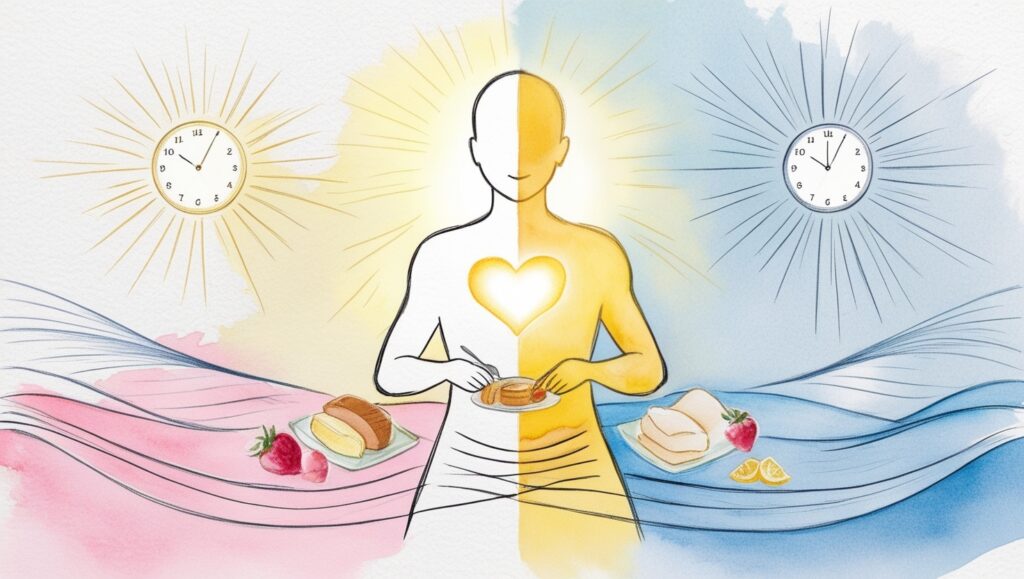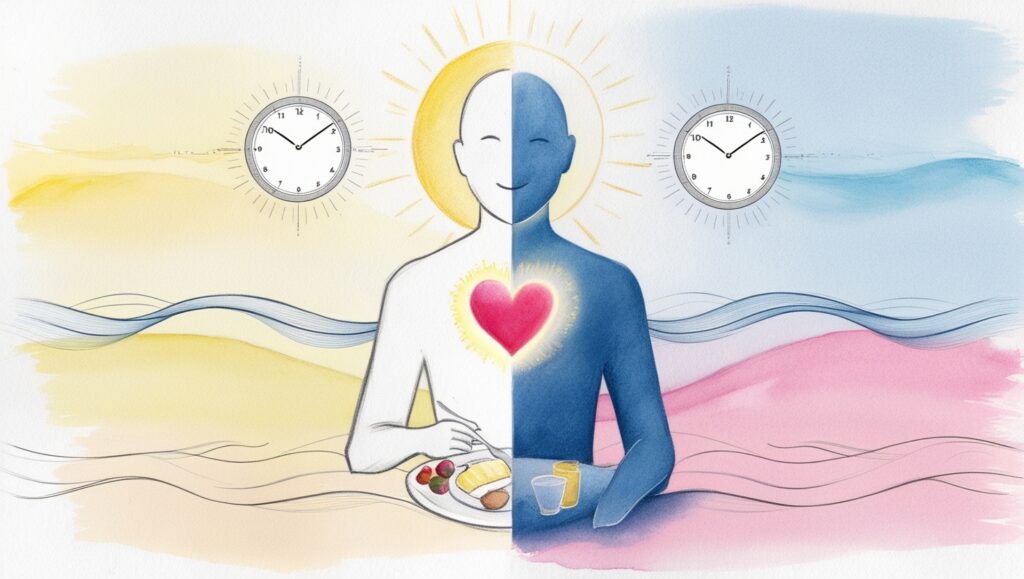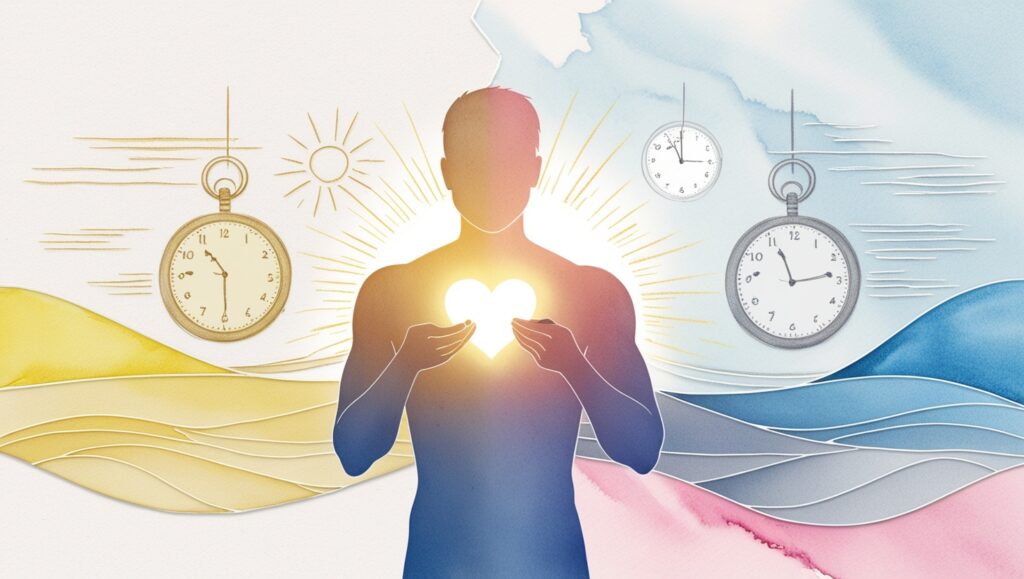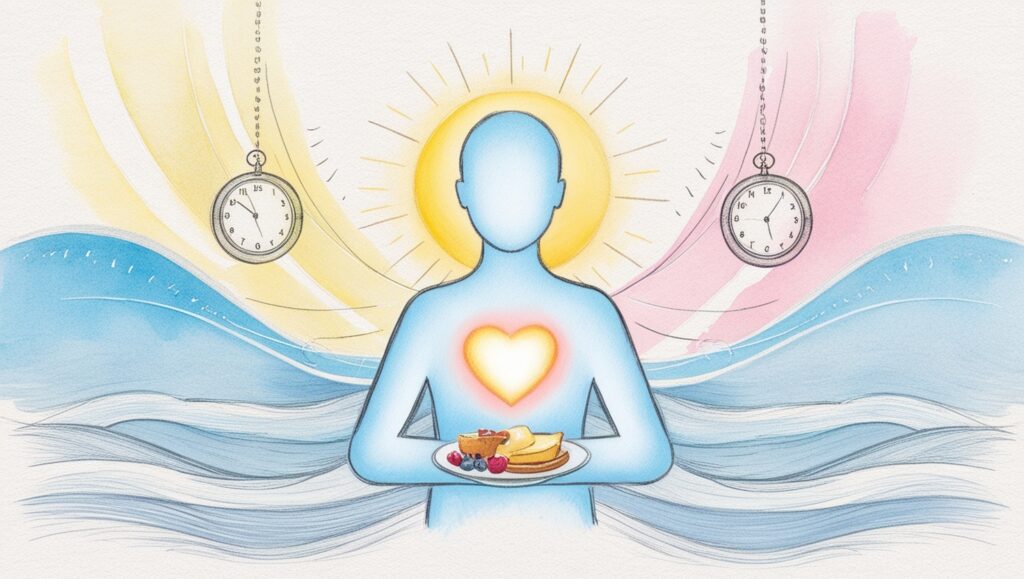How Does Daytime Eating Improve Heart Health 2025
How Does Daytime Eating Improve Heart Health 2025
Maintaining a healthy heart is one of the most important aspects of overall well-being, and recent research highlights a surprising ally in this goal: the timing of our meals. While we often focus on what we eat, when we eat has emerged as a crucial factor, especially in the context of heart health. In 2025, scientists and nutritionists are placing increasing emphasis on daytime eating as a strategy to support cardiovascular function, reduce disease risk, and align the body’s natural rhythms with metabolic health.
In this blog, we’ll explore the connection between meal timing and heart health, delve into the science behind our biological clock, and see how simple changes to your eating schedule can yield profound health benefits.
Understanding the Body’s Internal Clock (Circadian Rhythm)
Our bodies operate on a 24-hour cycle known as the circadian rhythm. This internal clock regulates everything from sleep and hormone release to digestion and metabolism. Importantly, it also controls the cardiovascular system.
During the day, our bodies are naturally more active and metabolically responsive. Blood pressure tends to rise in the morning and reach its peak in the afternoon. At night, the body slows down in preparation for rest and repair. Eating during the day supports this rhythm by supplying energy when it’s most needed and avoiding disruption during the resting phase.
When we eat late at night, we go against this natural cycle. This misalignment, also known as circadian rhythm disruption, can increase the risk of several health problems — especially those related to the heart.
How Daytime Eating Supports Heart Health
Let’s explore how consuming most of your calories earlier in the day can benefit your cardiovascular system:
1. Reduces Blood Pressure Fluctuations
Studies show that eating earlier in the day helps maintain a steady blood pressure. Late-night meals are often linked to elevated nighttime blood pressure, which can place extra strain on the heart and arteries. By aligning food intake with your body’s active hours, you help the cardiovascular system stay in sync.
2. Lowers Risk of Obesity and Metabolic Syndrome
Obesity, high blood sugar, and high cholesterol levels are all risk factors for heart disease. Eating earlier in the day supports better metabolic function, making it easier for the body to process glucose and fats. When we eat late at night, the body stores more fat and has reduced insulin sensitivity, increasing the risk of heart complications.




3. Supports Better Cholesterol Profiles
People who eat earlier in the day tend to have lower LDL (bad cholesterol) and higher HDL (good cholesterol) levels. This effect is partly due to more efficient digestion and lipid metabolism during daylight hours.
4. Promotes Healthy Inflammation Levels
Chronic inflammation is a major contributor to heart disease. Nighttime eating, especially of processed or heavy foods, can trigger inflammatory responses. In contrast, daytime eating aligns with the body’s anti-inflammatory cycles, helping to maintain a healthy cardiovascular environment.
5. Encourages Consistent Energy Use
Eating during the day helps your body use energy as it is consumed. This reduces the risk of storing excess calories as fat, particularly the visceral fat that can surround internal organs and contribute to cardiovascular disease.
Scientific Evidence Behind Daytime Eating
Emerging studies from 2022 through 2025 reinforce the benefits of circadian-aligned eating. Research published in journals like the Journal of Clinical Endocrinology & Metabolism and Nature Metabolism show consistent results: individuals who eat earlier in the day tend to have better cardiovascular markers compared to those who eat the same amount of calories but later in the evening.
One particular study tracked two groups of participants over 12 weeks. Both groups consumed the same foods and calories. The only difference was that one group ate from 7 am to 3 pm, while the other ate from 12 pm to 8 pm. The early-eating group experienced significantly lower blood pressure, better insulin sensitivity, and improved lipid profiles.
Practical Tips for Daytime Eating
If you’re ready to support your heart through better meal timing, here are some steps to consider:
- Eat a substantial breakfast, ideally within one hour of waking up.
- Aim to consume most of your daily calories by mid-afternoon.
- Avoid heavy or high-fat meals after 6 PM.
- Stick to a consistent eating schedule, even on weekends.
- Try time-restricted eating with a window between 8 to 10 hours, such as 8 AM to 4 PM.
Is Daytime Eating for Everyone?
While the benefits are strong, it’s important to remember that everyone’s schedule and biological rhythm can vary. Some individuals may work night shifts or have cultural meal patterns that make daytime eating difficult. In such cases, focusing on nutrient quality, portion control, and avoiding heavy meals close to bedtime can still offer benefits.
Additionally, those with diabetes or other medical conditions should consult a healthcare provider before making major changes to eating patterns.
Final Thoughts
In 2025, the concept of “when” we eat is as important as “what” we eat, particularly when it comes to heart health. Daytime eating, aligned with the body’s natural circadian rhythm, can reduce the risk of heart disease by improving blood pressure, reducing inflammation, and optimizing metabolic processes.
As modern science continues to unlock the secrets of our internal clocks, it becomes increasingly clear that timing truly is everything. Shifting your meals to earlier in the day might be one of the simplest — and most effective — changes you can make to protect your heart for years to come.
—
Learn More from Our Blogs
Explore more fascinating science-backed insights:
What If We Could Harness Energy from Black Holes
https://www.edgythoughts.com/what-if-we-could-harness-energy-from-black-holes
How Does Social Media Impact Teen Mental Health 2025
https://www.edgythoughts.com/how-does-social-media-impact-teen-mental-health-2025
—
External Resource
For more in-depth reading on circadian rhythms and heart health, visit the Wikipedia page on Circadian Rhythm:
https://en.wikipedia.org/wiki/Circadian_rhythm
Are Smart Implants the Future of Human Health 2025
https://edgythoughts.com/are-smart-implants-the-future-of-human-health-2025/
What If Time Works Differently in Deep Space 2025
https://edgythoughts.com/what-if-time-works-differently-in-deep-space-2025/





